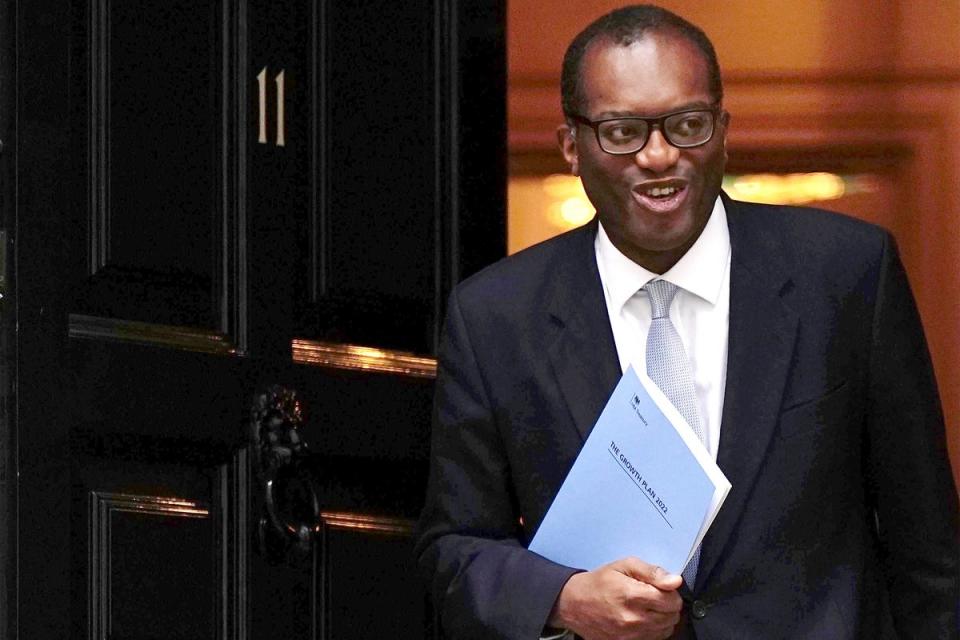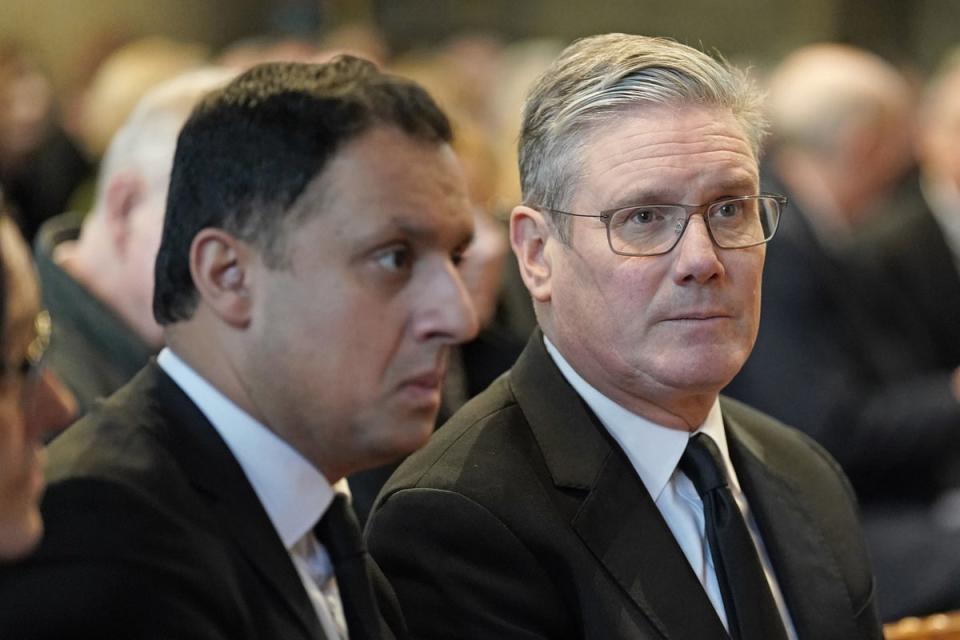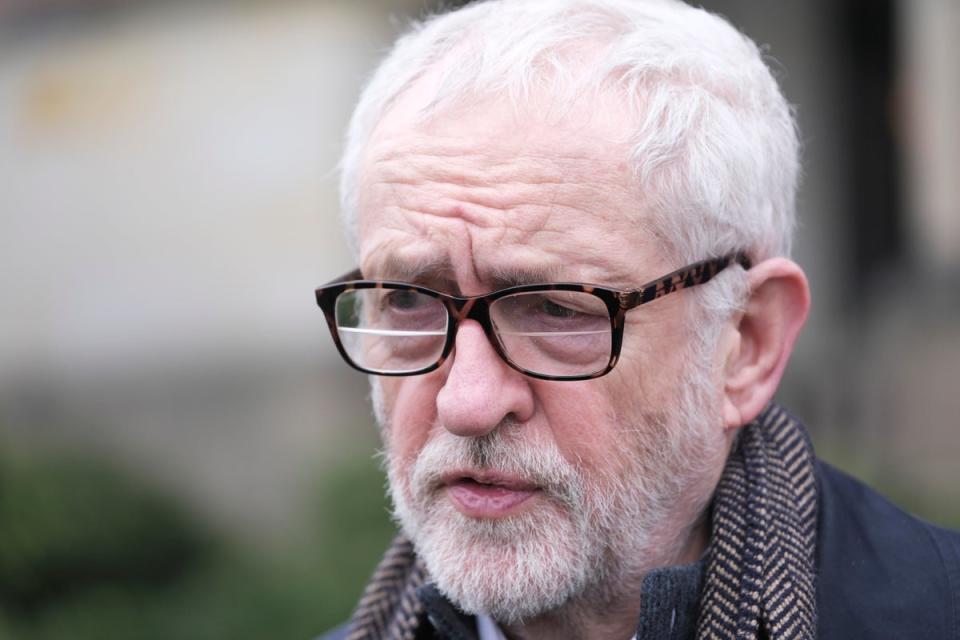Rachel Reeves sparks Labour backlash as she declares Starmer won’t cut bankers’ bonuses
Shadow chancellor Rachel Reeves sparked a Labour backlash after saying it will not scrap former Tory prime minister Liz Truss’s decision to lift the cap on bankers’ bonuses.
Ms Reeves told the BBC on Wednesday that the party “does not have any intention of bringing that back”.
Sir Keir Starmer’s top ally said that while the cap on bonuses was “the right thing to do to rebuild the public finances […] that has gone now and we don’t have any intention of bringing that back.”
Former leader Jeremy Corbyn joined left-wing Labour MPs in criticising the move – saying Sir Keir and Ms Reeves must appeal for support beyond “the already wealthy”.
And Scottish Labour leader Anas Sarwar said he still believed it was wrong to lift the cap – suggesting Ms Reeves should “keep it under review” if she becomes chancellor.
Strict regulations on bonuses, which limit annual payouts to twice a banker’s salary, were introduced by the EU in 2014 in a bid to avoid excessive risk-taking after the 2008 financial crisis.
Former prime minister Ms Truss and chancellor Kwasi Kwarteng made the decision to scrap the cap on bankers’ bonuses in 2022, in a bid to encourage more investment in the UK,

Sir Keir had previously vowed to curb bankers’ bonuses by reinstating the cap. He said in 2022 that lifting the cap “shows the Tories are absolutely tone deaf to what so many people are going through”.
Trade unions have also called for the cap to be reinstated, with the TUC declaring that the removal of the cap was fuelling a “greed is good” mentality.
The four big banks, HSBC, Lloyds, Natwest and Barclays paid an estimated £4bn in bonuses in 2021, and an estimated 3,000 UK bankers earn more than £1m per year.

The decision is the latest U-turn by the party under Sir Keir’s leadership, and comes just months after Ms Reeves said scrapping the bonus cap “tells you everything you need to know about this government”.
It comes amid mounting speculation the party is set to finally ditch its £28bn a year green spending pledge, having previously watered down the commitment.
But the decision on bankers’ bonuses is yet another signal from the Labour leader the party has fully parted with the left-wing influence of former leader Mr Corbyn.
Mr Corbyn seized on Ms Reeves’ decision, describing it as a “political choice to enrich the wealthy”. The ex-Labour leader contrasted it with the party’s refusal to commit to scrapping the two-child benefit cap, which he called “a political choice to impoverish the worst-off”.
Refusing to scrap the 2-child benefit cap is a political choice to impoverish the worst-off.
Refusing to reinstate the bankers' bonus cap is a political choice to enrich the wealthy.
4.2 million children are living in poverty, but will nobody think of the bankers?— Jeremy Corbyn (@jeremycorbyn) January 31, 2024
The Scottish Labour leader said he still believed it was wrong to lift the cap. “We were right to oppose the lifting of the cap on bankers’ bonuses,” Mr Sarwar told reporters. “At the time I said it was a further demonstration of an economically illiterate and morally bankrupt Tory party. I still believe that.”
Mr Sarwar said he wanted a Labour government to make sure “we never return to a situation where bankers can behave inappropriately and risk our wider economy like we saw with the financial crash”.
The Scottish Labour leader added: “I think we have to keep it constantly under constant review … I’m not here to defend bankers’ bonuses, I’m not here to defend banks – that’s something the UK Treasury has got to keep an eye on.”
Clive Lewis, left-wing MP for Norwich South told The Independent that “a lot of people will be disappointed” because “bankers bonuses, and the caps on them, weren’t just a policy implemented because of what happened in 2008”.
He said: “There was also an element of social and economic justice in what people perceived to be fair, which was that bankers, who had trashed the economy, who were then bailed out by the taxpayer ... should see limits to the amount of wealth that they could extract from the British economy.”
He added: “If in government, Labour has a historic chance to show the country we will do things differently, acting in the best interests of everyone – not just the already wealthy.”

Barry Gardiner, MP for Brent North, also told the BBC’s Politics Live that he “disagreed” with the decision and would “like to see [the cap] still there”.
“I think, actually, one of the things we do see in society is the gap between the very richest and very poorest is growing day by day,” said the left-winger. “I want to see a society that comes together that doesn’t have people struggling to keep the light on in their own home.”
And left-wing Labour MP John Trickett said bankers should not have “unlimited bonuses”. “I worked in 10 Downing Sreet at the time of 2008 financial crash ... I saw what happened when a culture of greed endangered the lives of working people,” he added.
Westminster leader of the SNP, Stephen Flynn, also criticised Labour’s policy. During PMQs, he said Rishi Sunak could be “comforted by the fact that he’s now no longer alone in this house in being completely out of touch with public opinion”.
The general secretary of the Fire Brigades Union, Matt Wrack, called Labour’s policy on bankers bonuses “utterly daft”.

Ms Reeves comments appear to be timed to coincide with a Labour conference with business chiefs on Thursday, where the party will seek to convince businesses that their investment is safer under a Starmer government than it is with the Conservatives.
Mick McAteer, co-director of the Financial Inclusion Centre, told the BBC that Labour was “going too far”.
“Ordinary people and the UK’s public services are still paying the price for that failure,” he said on the 2008 crash. “The City finance lobbies are very vocal at promoting the benefits of the sector. The City doesn’t need another champion in Labour,” Mr McAteer added.
It comes as Jeremy Hunt is understood to have warned Mr Sunak’s cabinet that tax cuts in the upcoming 6 March Budget are likely to be smaller than they were in the autumn statement.
The chancellor, in comments first reported by The Times, told colleagues: “We are not likely to have as much room for tax cuts as we had in the autumn.”

 Yahoo News
Yahoo News 
